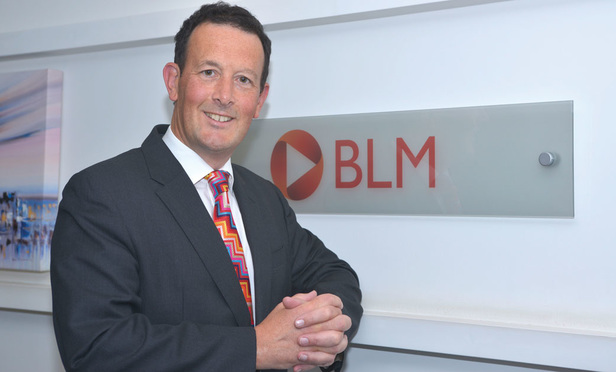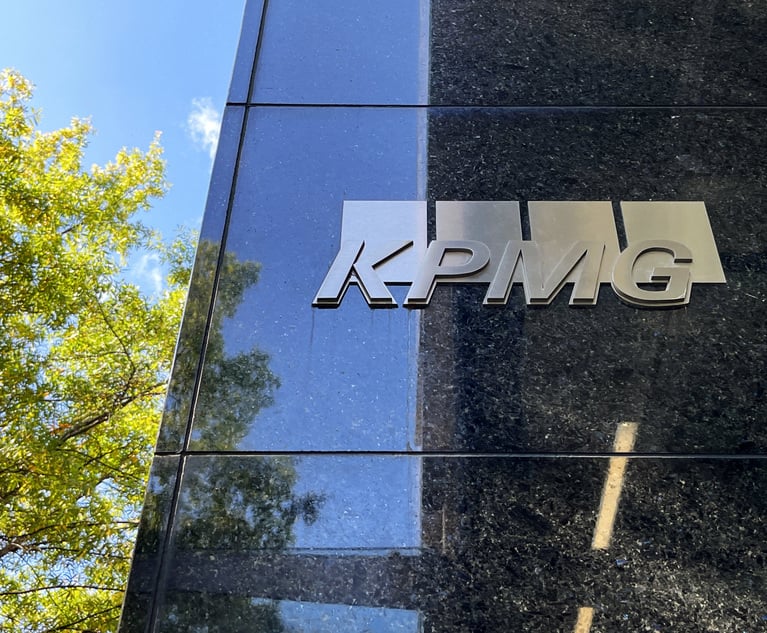 With a spate of high-profile partner exits and a second bank taking out a charge over the firm's assets, it is fair to say BLM has raised a few eyebrows in the insurance market lately.
With a spate of high-profile partner exits and a second bank taking out a charge over the firm's assets, it is fair to say BLM has raised a few eyebrows in the insurance market lately.
Within days of last month's resignation of London head Jennette Newman and fellow insurance partner Jonathan Edwards, it emerged that HSBC had joined Barclays in taking a debenture over the firm's assets in return for a refinancing package agreed through a club banking arrangement.
Coming after the sudden exit of managing partner Gary Allison in July, just eight months into his tenure, a redundancy consultation in August that led to 21 jobs being cut in Southampton and the loss of 50 back-office roles in February, the firm has had more than its fair share of bad headlines during the past year.
However, senior partner Mike Brown (pictured) remains defiantly positive about the firm's position.
He told Legal Week that the redundancies came after "tough decisions" about how to be more "operationally efficient". While he maintains that there will not be more cuts at BLM, he argues that there is going to be more restructuring across the industry.
"We are at the vanguard of it," he says. "This is driven by technology and client expectation and we are taking the steps that we need to take in a perfectly business-like way."
Traditionally, law firms have been able to persuade banks to fund them on overdraft facilities, which is bonkers
Similarly, while very few firms have financing agreements that give a lending bank a debenture over their assets, BLM maintains that its latest refinancing agreement, which makes HSBC a creditor alongside Barclays, is "testament [to BLM's] strong financial position".
Brown insists that the agreement gives BLM scope to grow and adds that the charge over the firm's assets is simply indicative of "how banks are risk managing their portfolios" in the post-financial crisis world.
He adds: "Traditionally, law firms have been able to persuade banks to fund them on overdraft facilities, which is bonkers, because that gives no security of funding for the law firm. If [other] law firms don't have these kinds of arrangements today, they will tomorrow."
One banking and finance partner who has previously worked on law firm insolvencies agrees with this stance, saying: "Any lender would look to see which assets they were lending against, so the firm must be okay financially as it is clearly worth something to HSBC."
However, a rival in the insurance market says BLM's finances have been a source of discussions in the wider insurance market for some time.
"I don't think BLM consolidating has surprised anyone, even if the more senior departures were a surprise," they say. "If you look at their topline over the years it has only grown very slowly and this year fell. When you are driving a juggernaut like BLM, that topline growth is very important."
BLM's 2016-17 financial results showed profit per equity partner (PEP) rebounded by 21% from £192,000 to £232,000 after a 28% drop the previous year; however, this was achieved against a slight dip in revenue from £107.7m to £106.7m.
Commenting on the firm's recent finances, BLM finance director Mark Blakemore says: "We have had two years during which growth has been slower, and it will be flat again this year, but the arrangement that we have put in place gives us great confidence that our plans for growth can be delivered. We have gone to the market to obtain a facility of £20m that is half provided by HSBC and half by Barclays, This will provide us with headroom to grow and develop our business further over three years."
One partner to have left the firm in the past 18 months says inconsistent PEP and stagnant turnover were a concern for them.
We are changing to reflect the social and economic environment that we are in
"Profits haven't been good and BLM had a lot of equity partners for its turnover," they say. "Even with PEP rising back above £200,000 a year, it is hardly time to celebrate. Their competitors are able to outstrip that; some are doing double that."
Another ex-partner agrees and adds that losing figures like Newman and Edwards would make fostering relationships with clients more difficult.
Referring to the departure of Newman and Edwards, they say: "It is big news that those two are going at the same time – it makes you wonder if there will be more moves from BLM. Those two were successful in terms of building relations with big clients, so they must have had concerns about the direction of the firm.
"Edwards had some major corporate clients and was heavily involved in the UK mergers, and a lot of Newman's clients were Lloyd's syndicates and London insurers. There is a good chance that those clients will move with them to Clydes."
The same ex-partner says the firm also suffered after falling off NHS Resolution's legal services panel in May this year, where it occupied two lots covering clinical negligence and non-clinical. The slots are worth £128m per annum across the 10 firms on the roster, according to the NHS's panel tender documents.
Another insurance rival says the income lost by falling off panels would damage any insurance firm and that replacing that income quickly would therefore be important.
They say: "Losing long-term, dependable revenue takes some time to replace. When you lose a place on a panel, you will have a period where existing cases take some time to run off. When it does, you need to make sure there is work lined up at the end of it."
Others argue that the firm also needs to be clear about its market position – though Brown refutes this, arguing that BLM had to present its strategy to the banks before securing the lending.
One ex-partner says: "It is difficult to break out internationally if you are basically a pure UK insurance firm. The market it is tough – they have got to decide who they are and what they want to do."
Despite the criticism, Brown is adamant that BLM is on the right path.
"The steps that we have taken have been carefully planned and have been presented to our partners as part of the programme that we are adopting," he concludes. "We are moving the dial in relation to our business at the pace that is required. It is not something that traditionally law firms have been used to, because they have been something of a protected species, but we are changing to reflect the social and economic environment that we are in."
NOT FOR REPRINT
© 2025 ALM Global, LLC, All Rights Reserved. Request academic re-use from www.copyright.com. All other uses, submit a request to [email protected]. For more information visit Asset & Logo Licensing.
You Might Like
View All
'A Death Sentence for TikTok'?: Litigators and Experts Weigh Impact of Potential Ban on Creators and Data Privacy

Skadden and Steptoe, Defending Amex GBT, Blasts Biden DOJ's Antitrust Lawsuit Over Merger Proposal
4 minute read
Amex Latest Target as Regulators Scrutinize Whether Credit Card Issuers Deliver on Rewards Promises

The Law Firm Disrupted: Tech Investment Is Necessary Yet Expensive. The Big Four Have a Leg Up
Trending Stories
- 1'A Death Sentence for TikTok'?: Litigators and Experts Weigh Impact of Potential Ban on Creators and Data Privacy
- 2Bribery Case Against Former Lt. Gov. Brian Benjamin Is Dropped
- 3‘Extremely Disturbing’: AI Firms Face Class Action by ‘Taskers’ Exposed to Traumatic Content
- 4State Appeals Court Revives BraunHagey Lawsuit Alleging $4.2M Unlawful Wire to China
- 5Invoking Trump, AG Bonta Reminds Lawyers of Duties to Noncitizens in Plea Dealing
Who Got The Work
J. Brugh Lower of Gibbons has entered an appearance for industrial equipment supplier Devco Corporation in a pending trademark infringement lawsuit. The suit, accusing the defendant of selling knock-off Graco products, was filed Dec. 18 in New Jersey District Court by Rivkin Radler on behalf of Graco Inc. and Graco Minnesota. The case, assigned to U.S. District Judge Zahid N. Quraishi, is 3:24-cv-11294, Graco Inc. et al v. Devco Corporation.
Who Got The Work
Rebecca Maller-Stein and Kent A. Yalowitz of Arnold & Porter Kaye Scholer have entered their appearances for Hanaco Venture Capital and its executives, Lior Prosor and David Frankel, in a pending securities lawsuit. The action, filed on Dec. 24 in New York Southern District Court by Zell, Aron & Co. on behalf of Goldeneye Advisors, accuses the defendants of negligently and fraudulently managing the plaintiff's $1 million investment. The case, assigned to U.S. District Judge Vernon S. Broderick, is 1:24-cv-09918, Goldeneye Advisors, LLC v. Hanaco Venture Capital, Ltd. et al.
Who Got The Work
Attorneys from A&O Shearman has stepped in as defense counsel for Toronto-Dominion Bank and other defendants in a pending securities class action. The suit, filed Dec. 11 in New York Southern District Court by Bleichmar Fonti & Auld, accuses the defendants of concealing the bank's 'pervasive' deficiencies in regards to its compliance with the Bank Secrecy Act and the quality of its anti-money laundering controls. The case, assigned to U.S. District Judge Arun Subramanian, is 1:24-cv-09445, Gonzalez v. The Toronto-Dominion Bank et al.
Who Got The Work
Crown Castle International, a Pennsylvania company providing shared communications infrastructure, has turned to Luke D. Wolf of Gordon Rees Scully Mansukhani to fend off a pending breach-of-contract lawsuit. The court action, filed Nov. 25 in Michigan Eastern District Court by Hooper Hathaway PC on behalf of The Town Residences LLC, accuses Crown Castle of failing to transfer approximately $30,000 in utility payments from T-Mobile in breach of a roof-top lease and assignment agreement. The case, assigned to U.S. District Judge Susan K. Declercq, is 2:24-cv-13131, The Town Residences LLC v. T-Mobile US, Inc. et al.
Who Got The Work
Wilfred P. Coronato and Daniel M. Schwartz of McCarter & English have stepped in as defense counsel to Electrolux Home Products Inc. in a pending product liability lawsuit. The court action, filed Nov. 26 in New York Eastern District Court by Poulos Lopiccolo PC and Nagel Rice LLP on behalf of David Stern, alleges that the defendant's refrigerators’ drawers and shelving repeatedly break and fall apart within months after purchase. The case, assigned to U.S. District Judge Joan M. Azrack, is 2:24-cv-08204, Stern v. Electrolux Home Products, Inc.
Featured Firms
Law Offices of Gary Martin Hays & Associates, P.C.
(470) 294-1674
Law Offices of Mark E. Salomone
(857) 444-6468
Smith & Hassler
(713) 739-1250








